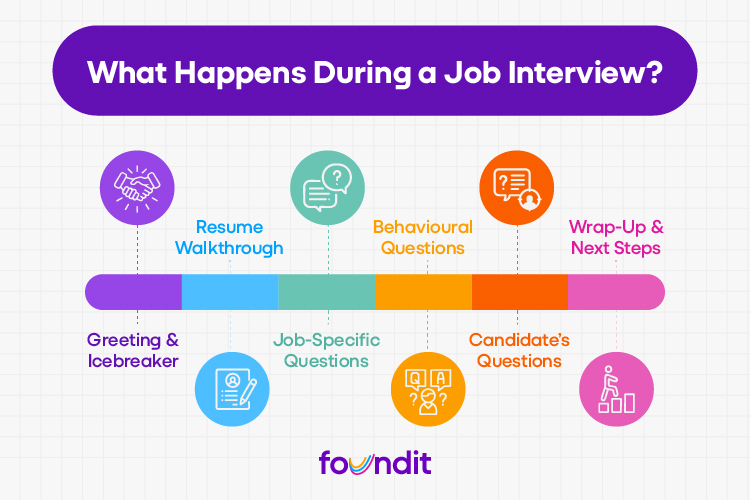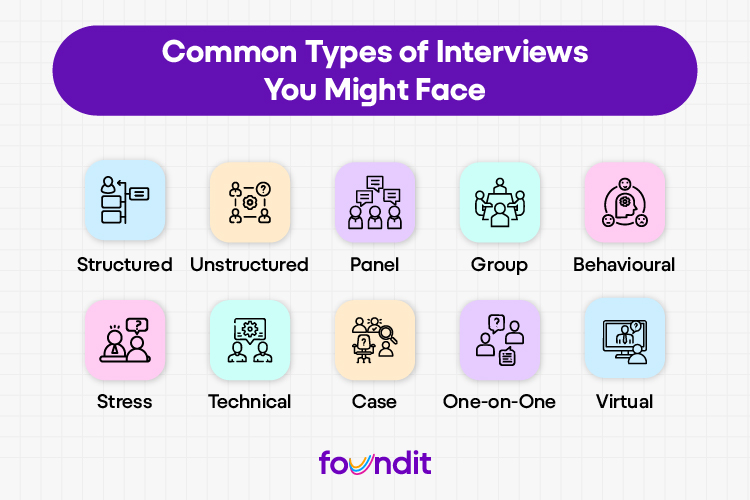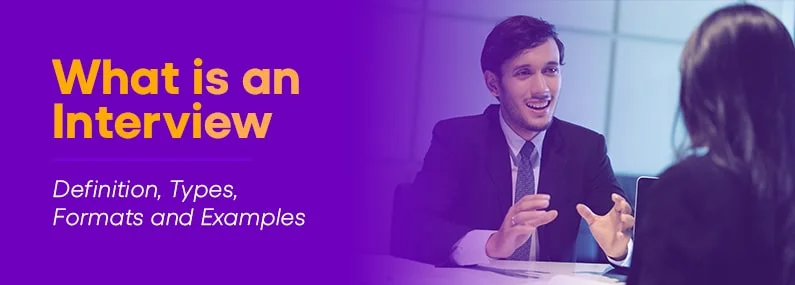Everyone talks about interviews—but how often do we really pause to ask: what is an interview? For many job seekers, it’s a familiar term wrapped in a lot of pressure. It feels formal, important, and sometimes, unpredictable.
But at its core, an interview is just a structured conversation. It’s a way for employers to understand who you are beyond your resume—and for you to get a sense of the company behind the job post.
Understanding the different types of interviews and interview formats can help you show up better prepared. Whether you're fresh out of college or switching careers, knowing what to expect gives you a real edge.
In this guide, we’ll break down the true interview meaning, cover all major types and formats, share practical examples, and give you a clear roadmap to prepare with confidence.
What is an Interview?

An interview is a formal or informal meeting between a job applicant and an employer (or recruiter) that helps assess whether the candidate is a good fit for the role.
At its simplest, it’s a conversation—but with a clear purpose.
Interview Definition
The most accepted interview definition is:
“A structured process of evaluating a candidate’s qualifications, experience, and suitability for a job through direct questioning and conversation.”
This definition holds true across industries, whether it’s a tech interview or a customer service role.
Why Do Interviews Matter?
For employers, it’s a chance to assess:
- Your communication skills
- Cultural fit
- Problem-solving or technical abilities
- How you present yourself beyond your resume
For candidates, it’s an opportunity to:
- Learn more about the company culture
- Understand job expectations
- Evaluate growth opportunities
- Decide if this is where you see yourself
Purpose of an Interview
The purpose of an interview isn’t just to quiz you. It’s about:
- Clarifying what’s on your CV
- Testing how you think in real-time
- Gauging your interest and attitude
- Helping both sides make an informed decision
Related: 8 Types of Interview Methods with Tips and Benefits
Types of Interviews

Not all interviews look or feel the same. The types of interviews you experience can vary depending on the role, company culture, and hiring stage. Here’s a breakdown of the most common formats—and how they usually play out in real life.
1. Structured Interview
In a structured interview, the interviewer asks a standard set of questions to every candidate in the same order. This ensures consistency and helps with fair comparisons.
Example: A bank hiring for a customer service role might ask each applicant the same six questions focused on conflict resolution, teamwork, and sales conversion.
2. Unstructured Interview
This is a free-flowing conversation with no strict question list. A unstructured interview allows the interviewer to follow up based on your responses and see how naturally you communicate.
Example: In a creative agency, the hiring manager might casually ask, “Tell me about a project you really enjoyed,” and take the discussion from there, without following a script.
3. Behavioural Interview
A behavioural interview explores how you’ve handled situations in the past. The goal is to understand how you think and respond to real challenges—often using the STAR method (Situation, Task, Action, Result).
Example: “Tell me about a time when you had to meet a tight deadline. How did you handle it?” You’ll be expected to walk them through your experience clearly.
4. Panel Interview
In a panel interview, multiple people from the company interview you at once. It’s often used to save time and assess how you interact with different teams or perspectives.
Example: If you’re interviewing for a product role, the panel might include someone from engineering, marketing, and HR—all asking you questions related to their functions.
5. Group Interview
A group interview involves several candidates being interviewed together. Employers use this to observe how you interact, communicate, and stand out in a crowd.
Example: A retail brand hiring for a sales associate role may invite 10 candidates into a room, ask them to solve a team task, and note who takes initiative or listens well.
6. One-on-One Interview
This is the most traditional format—a one-on-one interview between the candidate and a single interviewer. It’s focused and personal, giving both sides space to ask deeper questions.
Example: A campus recruiter sits down with a final-year student and asks about their academic background, project work, and interest in the company.
7. Stress Interview
A stress interview puts you in a high-pressure scenario on purpose to see how you handle it. It’s not personal—just a way to observe your reaction under discomfort.
Example: You’re asked to solve a puzzle with someone watching the clock, or the interviewer interrupts you frequently to test your composure.
8. Technical Interview
A technical interview assesses your hands-on skills. It could involve writing code, solving equations, or explaining how you’d handle specific job scenarios.
Example: A software engineer is asked to build a basic search function in Java during a live coding session while explaining their thought process.
9. Case Interview
A case interview presents you with a problem (often business-related) and asks you to analyse it. It tests logic, communication, and strategic thinking.
Example: “Our client’s profits have dropped. What steps would you take to identify the cause?” You’ll talk through your approach, not just the final answer.
10. Telephonic or Video Interview
These are remote interviews done via phone or video call. A telephonic or video interview is often used in early screening or when the job is remote-friendly.
Example: A recruiter calls to discuss your resume and availability. If that goes well, they schedule a Zoom call for a deeper conversation with the hiring manager.
Related: Ace Different Types of Interviews: Tips and Tricks
Types of Interview Formats
Beyond interview types, it’s also important to understand how interviews are conducted. These interview formats define the setting—whether it’s face-to-face, remote, or asynchronous. Knowing this helps you prepare for the actual environment you’ll face.
1. In-Person Interview
The traditional format—an in-person interview happens at the employer’s office. It allows for direct, uninterrupted interaction with clear body language and better engagement.
Example: You’re called into the company’s conference room for a 30-minute discussion with the hiring manager, followed by a brief office tour.
2. Virtual Interview
A virtual interview is conducted over platforms like Zoom, Google Meet, or Microsoft Teams. It’s common in remote hiring or early interview rounds to save travel time.
Example: You join a scheduled video call from your home, make sure your camera and mic work, and answer questions in a live session with the recruiter.
3. Telephonic Interview
A telephonic interview is voice-only and often used in first-round screenings. It’s less formal but still assesses your clarity, professionalism, and basic suitability for the role.
Example: A recruiter calls to quickly verify your qualifications, availability, and salary expectations before moving you to the next stage.
4. Asynchronous Interview
Also known as a one-way or recorded interview, an asynchronous interview lets you record answers to pre-set questions at your convenience—without a live interviewer.
Example: You receive a link to a platform where you see questions one at a time and record short video responses that are later reviewed by the hiring team.
5. Hybrid Interview
A hybrid interview blends in-person and virtual components. For example, one round might be online, while the final discussion takes place at the office.
Example: You clear a virtual tech interview from home and then visit the office for a final round with the leadership team.
In-Person vs Virtual vs Asynchronous Interviews
| Criteria | In-Person Interview | Virtual Interview | Asynchronous Interview |
|---|---|---|---|
| Setup Time | Requires scheduling a physical meeting room | Quick setup via video call link | No scheduling needed; candidate records anytime |
| Interaction Level | High—face-to-face, full body language cues | Moderate—visual + verbal, minor lags | Low—no live interaction; questions answered solo |
| Tech Dependency | Low (basic devices) | Medium—requires stable internet & webcam | High—platform setup, video recording tools |
| Common Industries | Finance, healthcare, operations | Tech, startups, remote-first roles | BPO, early screening, volume hiring roles |
| When Used | Final rounds or senior roles | Mid to final rounds, remote hiring | Initial screening, mass hiring, async roles |
Also Read: Top 50 Basic Interview Questions and Answers
Common Interview Questions with Sample Answers
Interviews don’t come with a script, but some questions do show up more often than others. These are the ones hiring managers rely on to understand who you are, how you think, and whether you’d be a good fit. Here are a few common interview questions—along with answers that can help you find your own voice.
1. Tell me about yourself
This isn’t about your life story. Keep it brief—focus on your background, a few strengths, and what brings you to this role.
Sample Answer:
I studied marketing and started out working with a small agency where I got hands-on experience with social media campaigns. Over the past couple of years, I’ve leaned more into content strategy and really enjoyed the process of understanding audience behaviour. I’m now looking for a role where I can apply those skills to a brand with a larger impact—and your team seemed like the right place to grow.
2. What are your strengths and weaknesses?
Be honest, but smart. Pick a real strength and a weakness you’ve actively worked to improve.
Sample Answer:
I’d say one of my strengths is adaptability. I tend to settle quickly in new teams or systems. As for a weakness—I used to take on too much and hesitate to delegate, especially when deadlines were tight. But I’ve learned that asking for help is actually a strength, not a setback.
3. Why do you want to work here?
Show that you’ve done your homework. Talk about what stood out to you about the company, the role, or the team.
Sample Answer:
What really stood out to me was your focus on sustainability and innovation—I saw some of the campaigns you’ve run recently and appreciated how clear the brand voice was. I also like that the role allows for both strategy and hands-on work, which is how I like to operate.
4. Tell me about a challenge you faced and how you handled it
This is where examples matter. Think of something specific, even if it’s small, and walk them through what you did.
Sample Answer:
At my last job, we had to deliver a campaign in under a week because of a last-minute client shift. The timelines were tight, and we had just one designer. I broke the work into small chunks, handled copywriting and coordination myself, and checked in with the team twice a day. It was stressful, but we delivered on time—and the client actually extended our contract after that.
Helpful Articles
| Improve Your Personal Development Skills | Analytical Skills for the Workplace |
| Mastering Essential Communication Skills | Write an Interview Confirmation Email |
5. Where do you see yourself in five years?
You don’t need to give a perfect roadmap. Just share the direction you’re headed in—and how this role fits into it.
Sample Answer:
Honestly, I’m still shaping that path. But I do know I want to grow in a role where I can take on more responsibility, maybe lead a small team, and get deeper into digital strategy. I’m looking for a place that values that kind of development—and from what I’ve read, this team does.
Quick Help: Best Answers to “Describe Yourself in 3 Words”: Top 50
Interview Preparation Tips
Even if you’re confident in your skills, interviews can still feel intimidating. The good news? Most of what makes a strong interview comes down to preparation. These simple, honest tips can help you feel more grounded and less overwhelmed—no matter what type of interview format you’re walking into.
1. Understand the role and company
Read the job description properly. Then go a bit deeper—look at the company’s website, social channels, and recent news. You don’t need to memorise facts, but you should have a clear idea of what they do, how they work, and why the role exists.
2. Practice common questions—but don’t memorise
Go over typical interview questions and think through how you’d answer them. Use examples from your own experience. But avoid sounding scripted—interviewers can usually tell when you’ve memorised lines.
3. Know your resume inside out
Anything you list on your resume is fair game in an interview. Be ready to talk about past roles, skills, and projects—even the older ones. If there are gaps or changes, be honest and clear about why.
4. Prepare your questions too
When they ask, “Do you have any questions?”—always say yes. Prepare 2–3 thoughtful questions. It could be about the team, upcoming projects, or what success looks like in the role. It shows you care and helps you learn more, too.
5. Plan your setup if it’s virtual
If it’s a video interview, check your tech. Camera, mic, lighting, and internet—all working? Find a quiet space. If things go wrong (they sometimes do), stay calm. Just let them know and reschedule if needed.
6. Dress for the role
You don’t need a full suit unless the company culture expects it. Aim for neat, professional, and appropriate for the role. Even in a virtual interview, looking presentable makes a difference in how you feel and come across.
7. Take a breath—literally
Before the interview starts, take a few deep breaths. It helps settle your nerves. Remind yourself: this is just a conversation. You’re not being tested—you’re seeing if it’s the right fit, on both sides.
Real-World Interview Examples
Sometimes, the best way to understand what an interview is—is to see how it actually plays out. Here are a few simple, real-world scenarios from different job roles. These examples aren’t perfect. But they’re relatable, and that’s what makes them useful.
Example 1: Marketing Associate – Behavioural Interview
Context: The interviewer asks, “Tell me about a time when you had to handle a difficult client.”
Candidate’s response:
In my previous job at a digital agency, we had a client who wasn’t happy with the social media creatives. I asked for a quick call to clarify what wasn’t working. Turns out, they wanted something more product-focused. I worked with the design team to revise the visuals and delivered updated posts in 48 hours. They appreciated the quick turnaround—and extended our contract.
Example 2: Software Developer – Technical Interview
Context: The interviewer says, “We want you to build a basic login form and talk through your approach.”
Candidate’s response:
I’d start by creating a simple form with fields for email and password. Then I’d add client-side validation to check format and blank inputs. On submission, I’d send the data to an API endpoint using a POST request. If the response is successful, I’d redirect the user. If not, show an error message. I’d also make sure the password is hashed and not stored in plain text.
Example 3: Customer Support Executive – One-on-One Interview
Context: The hiring manager asks, “How do you handle angry customers on the phone?”
Candidate’s response:
First, I let them speak fully without interrupting. I’ve learned that most of the frustration comes from not feeling heard. Once they finish, I apologise for the inconvenience and repeat back the problem so they know I’ve understood. Then I offer the quickest possible solution or promise a timeline. Even if the issue can’t be fixed right away, honest communication usually helps calm things down.
Example 4: Sales Trainee – Group Interview
Context: A group task is given: “Pitch this bottle of water to the panel.”
Candidate’s response:
I kept it simple and short. I said, “We’re not just selling water—we’re offering convenience. It’s clean, portable, and reliable. Whether you’re at work or on a run, this bottle fits in your routine. And at this price, you don’t have to think twice.”
The panel noted that while others focused on features, I kept the customer’s lifestyle in mind. That gave me an edge.
Don’t Miss: 20 Practical Interview Tips to Get a Job Offer in 2025
FAQs on Interview Meaning and Purpose
What is the main purpose of an interview?
Answer: The main purpose of an interview is to assess if the candidate is a good fit for the job—both in terms of skills and personality. It’s also a chance for the candidate to evaluate if the role and company align with their goals.
What are the different types of interviews?
Answer: Common types of interviews include structured, unstructured, behavioural, panel, group, stress, technical, and case interviews. Each is designed to test different aspects of a candidate’s abilities and mindset.
What are the most common interview formats?
Answer: Popular interview formats include in-person interviews, virtual (video) interviews, telephonic interviews, and asynchronous or one-way video interviews. Some companies also use hybrid formats.
How do I prepare for different interview types?
Answer: Understand the format first. For technical roles, practice coding or whiteboarding. For behavioural rounds, prep with STAR-based answers. If it’s virtual, check your tech setup. And always research the company and the job role well.
What should I avoid saying in an interview?
Answer: Avoid badmouthing previous employers, giving vague or dishonest answers, or saying things like “I don’t know” without trying. If unsure, reframe it as “That’s an area I’m learning more about.”
Final words
Interviews can be nerve-wracking, but understanding what they really are—structured conversations with a purpose—makes them easier to approach. Whether you’re stepping into your first job or switching roles after years, being prepared and present makes all the difference.
Use this guide to get familiar with the types of interviews, interview formats, and the kind of questions you’re likely to face. There’s no one right answer, but with a little thought and practice, you can walk in ready—and leave with confidence.
Job By Role:




